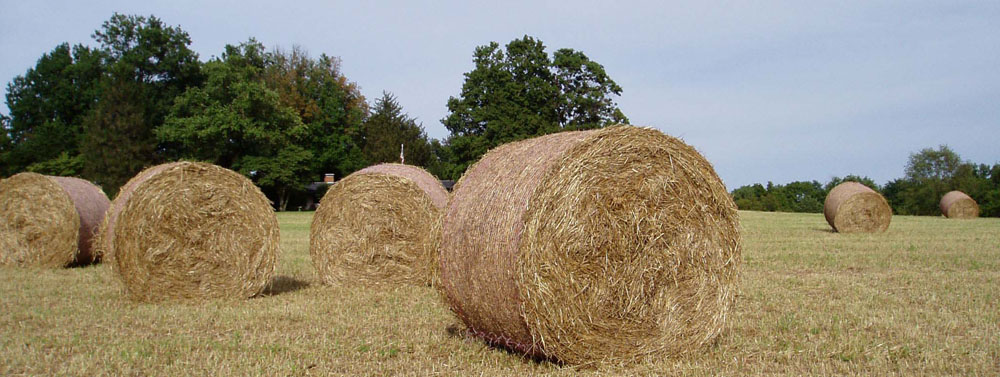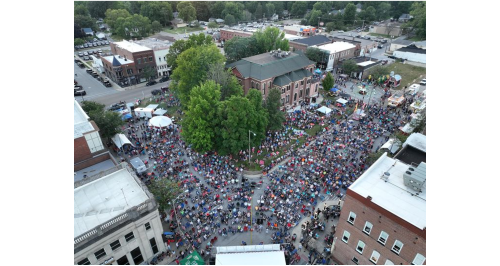The Power of Community Energy in Creating Rural Wealth
Homebase for Biomass Rules, LLC is Greenville, IL, population, 7,000. I have lived in rural communities across the US, in Europe, and in Asia. When I was young each place was just somewhere to live. Over the years, I began to notice that attributes of the Greenville community were not the same as other places. There was an energy of inclusiveness and pride that were not like other communities.
This image is from the 2024 Bond County Fourth Fest on July 6, 2024. I give the planners of this event all the credit. They do a great job and people came from miles around. But this is more common than uncommon. There are festivals, ribbon cuttings, and activities that go on all year round in this uncommon community.
In the undergraduate economics classes at Greenville University, I taught the idea of wealth creation in rural America. Greenville University is the private, faith-based, liberal arts college here. Before I returned to teach at Greenville in 2016, it was clear that local markets are more than simply spending money “locally.” When certain products are produced locally (supplied) and consumed locally (demanded) it is more than simply spending money, local wealth is created.
Creating Wealth: Creating economic wealth is not about getting rich. It is growing value. When national economies grow, that is a form of wealth creation. One common metric is the Gross Domestic Product (GDP). It is a good and well-established metric that can be consistently quantified and provides a significant benchmark for economies to reference. However, it doesn’t capture some things. One of the attributes not measured very well are products and services that are not easily monetized, or do not have an established and representative dollar value. Reviewing other important previous posts for background,
- The early post, Adding Value to Benefits, Not Readily Monetizable, introduces this idea that things may have value even if there is no price. In terms of rural wealth, this shows up in social, cultural, and political capital. In more common terms those are volunteer hours, values, and networks of influence, respectively.
- The post, Local, the Uneasy Substitute to Global, compares local markets to global markets. Agriculture, bioenergy, and local agritourism work well locally. The fact that they also work well globally makes it a little less clearcut (see 4th bullet point). But when local is the comparative advantage, it makes sense to maximize that market and move the leftovers into more of the global markets.
- Bioenergy Success Depends on Local Markets that ‘Are in the Neighborhood’ differentiates between simply spending money locally and balancing local supply with local demand. The latter creates a local comparative advantage. And this works well for bioenergy, local specialty food products and restaurants, and unique agritourism experiences.
- Finally, A Tale of Two Markets: Local and Global, describes the “both, and” nature of local and global markets.
Notable Attributes: Greenville, Illinois generates a unique mix of volunteer hours, a value for service to the community, and just enough political capital to make significant connections. For its size, Greenville has no shortage of churches and museums. The college, high school, and community art organizations and businesses mean there are plays, concerts, athletic events, junior livestock shows, and art shows. There is an uncommon pride with Bond County history to add to the passion for service. And from an economic standpoint there are several large employers and connections through Greenville with roads and railroads. This community is also fiercely entrepreneurial.
Mostly the exploration of rural wealth creation, with all its undervalued facets, is an economic frontier. I told my economic students of the 700-page, 17th edition textbook that we navigated in two semesters – almost none of the under-monetized products and services we discussed about rural wealth – are covered in the text. Even in 2024, there are volumes of economic theory yet to be discovered and written.
As with the gray boundaries of local and global, it doesn’t mean the well-established economic theory is incorrect. To the contrary, it only indicates that there is more to learn. And more choices from which to chart a pathway forward in rural communities.
Local economies, rural wealth creation, and outstanding Fourth of July Celebrations are an excellent way to honor Independence Day. Well done, Greenville!



Comments
The Power of Community Energy in Creating Rural Wealth — No Comments
HTML tags allowed in your comment: <a href="" title=""> <abbr title=""> <acronym title=""> <b> <blockquote cite=""> <cite> <code> <del datetime=""> <em> <i> <q cite=""> <s> <strike> <strong>